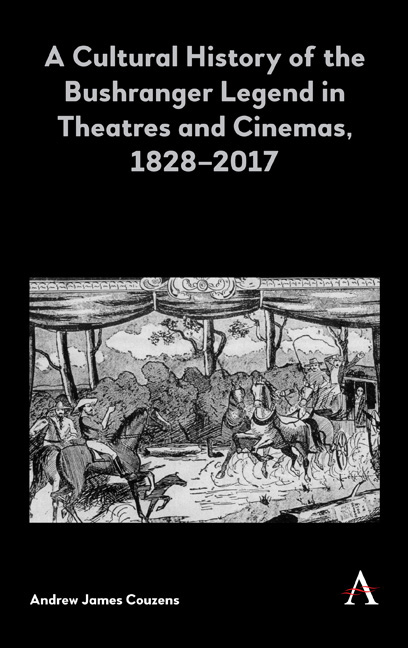Summary
In many ways it is peculiar that the bushranger legend has remained so salient in Australian self- definition. Outlaws, and by extension bushrangers, are defined by their lack of belonging and their resistance to the institutions and dominant ideologies from which the concept of nation usually emerges. Nevertheless bushrangers in the cultural imaginary as established in the films considered within this study emerged not as antagonists to the national image but as acceptable and legitimate representations of uniquely Australian characteristics. Perhaps this is a result of the consistent reevaluation of identity that is characteristic of Australia's postcolonial status. Attempts to define Australian character, whether on behalf of 1890s urban bohemians, radical nationalists after World War II or revisionists after the Bicentenary, sought distinctiveness from those in charge. Bushrangers therefore became a useful way of celebrating uniquely Australian resistance to British or other authority. The bushranger legend appears to serve a cultural need and allow Australians to retrospectively reject the dominant powers of their past and constantly redefine themselves, a way of escaping culpability for inconvenient attitudes and actions of the past or of adapting the national imaginary to include constantly morphing demographics. It allows the national character to be constantly reshaped while also grounding it in history.
It is important to acknowledge that this somewhat intangible reasoning for the prevalence of the bushranger legend in conceptualizations of Australian character is far from the complete picture. On the stage and on the screen, bushrangers participated in spectacular narratives as markers of distinctiveness. It was there, for very practical reasons of business or politics, that the bushranger legend emerged and evolved. The films and plays in this study contributed to and took inspiration from a tangled web of shifting social values, industrial pressures and political influences. Examining not only the textual meanings embedded within the films but also their political and industrial contexts results not in a narrative seeking to discover what the nation is through cinema but instead considering how different interests mobilized the cinema and the bushranger legend for specific political and social purposes, how different representational and narrative traditions gained and lost currency and how the film industry orientated itself within both national and global frameworks of value.
- Type
- Chapter
- Information
- Publisher: Anthem PressPrint publication year: 2019



